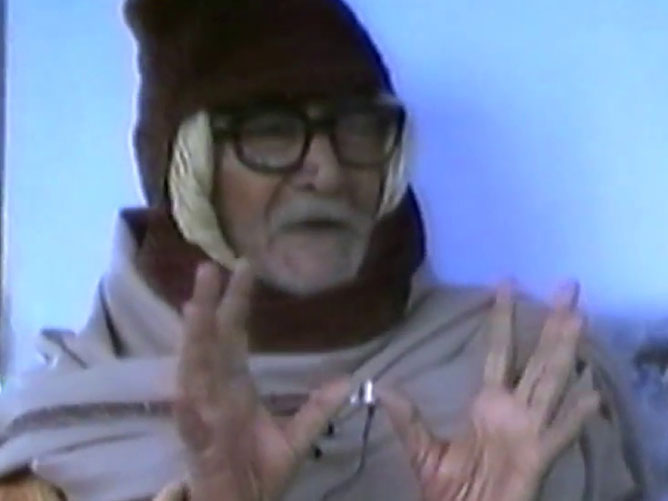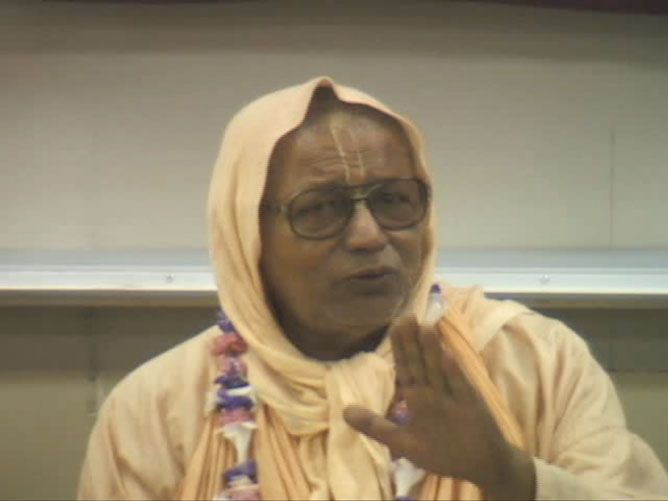VIDEO
OUR OBJECT
OF WORSHIP AND AFFECTION
An informal discourse given at Sri Chaitanya Saraswat Math
in Sri Nabadwip Dham, West Bengali, India in the 1980’s
Primary subjects of discussion
- Relationship with Sri Guru as per Srimad Bhagavatam 11.2.37
- Sincerity
- Krishnanusandhan: searching for Sri Krishna
- The greatest illustrations of divine mercy
This discourse was given in February of 1982, but the exact date is unknown.
Literal Transcript
Śrīla Śrīdhar Mahārāj: Bhāratī Mahārāj is here?
Students: Yes Mahārāj.
Śrīla Śrīdhar Mahārāj: No question from you? What is this?
Students: (Laughter)
Śrīpād Bhāratī Mahārāj: Trying to harmonise.
Śrīla Śrīdhar Mahārāj: Vijñān Bhāratī. Ha ha. Vijñān Bhāratī. Sounds, speech, words, filled up with viśiṣṭa-jñān: words consisting of scientific knowledge or higher knowledge; words filled up with high knowledge. And in the field of devotion: Bhakti Vijñān Bhāratī.
Śrīpād Akṣayānanda Mahārāj: Very dignified name.
Śrīla Śrīdhar Mahārāj: Ha ha. So, you are to keep up the dignity of the name. Ha ha ha.
Gauraharibol. Nitāi Gauraharibol.
And he is ki? Bhakti ki Parvat?
Students: Bhakti Vilās.
Śrīla Śrīdhar Mahārāj: Bhakti Vilās Parvat: the parvat who is containing the bhakti-vilās, the play of devotion, the play of love. Displayed where? In the caves of mountain, Govardhan. Jñāna-śūnya-bhakti.
Hare Kṛṣṇa.
Śrīpād Bhāratī Mahārāj: Mahārāj?
Śrīla Śrīdhar Mahārāj: Yes.
Śrīpād Bhāratī Mahārāj: You didn’t explain the last line of that verse.
Śrīla Śrīdhar Mahārāj: Which?
Śrīpād Bhāratī Mahārāj: The bhayaṁ dvitīya …
Śrīla Śrīdhar Mahārāj: Huh?
Śrīpād Akṣayānanda Mahārāj: bhayaṁ dvitīyābhiniveśataḥ syād Īśād apetasya …
Śrīla Śrīdhar Mahārāj:
tan-māyayāto budha ābhajet taṁ
bhaktyaikayeṣaṁ guru-devatātmā
(Śrīmad Bhāgavatam: 11.2.37)
How to be reinstated into that harmony? If we lose the harmony, how to be reinstated? Bhaktyaikayeṣaṁ Guru-devatātmā: only by devotion, only by devotion, only by surrender, surrendering. Not by calculative attempt but by surrendering. And what is the type of surrender? Guru-devatātmā: Gurur eva devatā ātmā cha. Guru-devatātmā: it may come in the first plane of explanation Guru and Devatā. Devatā means abhīṣṭa, for to give whom Guru has come. This is Guru-devatātmā. That He Himself is Guru, and what the Guru comes to give, three things must be represented there. Guru-devatātmā: The disciple, the Guru, and the summum bonum, the goal—that will be one. One means not physically one, but in one tune, in one sweet connection: Guru-devatātmā. Again, Gurudeva Devatā ātmā cha: Guru is everything. He is Devatā; we shall try to find our goal also in Guru. And ātmā, Devatā. And ātmā means priya. Guru is the object of my worship as well as he is object of my love and affection: Devatātmā. In this way we shall concentrate, and we will be reinstated in no time in former position, back to home. We are to rely on Gurudev.
And who is Guru? Guru is he who has come to deliver me, to take me there. Guru is not a static, not a static thing, but he is of dynamic character. He is living, so living that we are requested to see him as the ultimate: Sākṣād dharitvena. Āchāryaṁ Māṁ vijanīyat: you want Me; you want Me. I have come to take you to My own place. Guru is such, in whatever lower position you may be. “You are born in the line of the fish. I have come to you in form of a fish: Matsya-avatār. You have come as a tree. I have come in the form of a tree. In this way, I have come here to take you in.” That is the general conception of Guru. He has come. Then again He comes, how? In different representation He can come, but He is there within. None can give Him without He Himself.
yam evaiṣa vṛṇute tena labhyaḥ
(Kaṭha-upaniṣad: 1.2.23)
Super … The conception of the super existence is such that they can come down, but we cannot go up to Him. So, He is coming down. That is the most indispensable thing. So, He comes down in different ways, in different forms. In different installment, He may come. But if any connection we really to have with Him, He will have to come, but He may come in different form, different plane. But still, it is dynamic and not fully identified with a particular plane or form. We are find it in that way.
Guru-devatātmā. Gurudeva: Devatā; and not a human form with some human mentality, with some human education, with some sort of particular knowledge in the spiritual world—not. Gurudeva: Devatā. Guru: Kṛṣṇa.
kṛṣṇa rūpa hana śāstrera pramāṇe
(Śrī Chaitanya-charitāmṛta: Ādi-līlā, 1.45)
So, in inner most finding, He is He who has come to take me, and He means He, His own, His representative. Also, if He comes here, He can … He is staying [as] His representative also. So, some representative also may come through Him, He may negotiate with me. So, Guru is infinite. Infinite. We should not give any finite characteristic in him. Still, because we are finite, so only with some sort of finite conception we are to approach, but at the same time we must be very careful that my limited knowledge, my prejudices, may not be bar to my way to progress in the unknown real path. So, Gurudeva: Guru-devatātmā. Anyhow, your deep connection and hankering for the object and who has mostly come to think for you and take your charge ostentatiously, you must not be lacking showing your fullest sympathy and cooperation with that deliver. This way you will be easily be taken in there by what you hanker after. Guru-devatātmā.
bhayaṁ dvitīyābhiniveśataḥ syād
īśād apetasya viparyayo asmṛtiḥ
tan-māyayāto budha ābhajet taṁ
(Śrīmad Bhāgavatam: 11.2.37)
“Fear because by His peculiar particular potency I am thrown here, so I must take that shelter to the potency.” It is not recommended in Bhāgavatam as the Śāktas, the Tantrics, say. “The Māyā has got direct connection with me, so I must take shelter of Māyā. And when Māyā will be satisfied with me, she will open the door, and I shall be allowed to go up.” But here Bhāgavatam says, “No, whose māyā? He is master of Māyā, and whenever you will show your tendency to be one with the … to satisfy Him, the Māyā automatically she will leave you. She will withdraw from you.” That is the Vaiṣṇava theory.
And in the good sense also it may be taken that Guru: he is also may be His potency. This māyic potency and the real potency—real and misconceived. The Guru is real potency that we must take shelter through him to Kṛṣṇa. In this way.
na hi kalyāṇa-kṛt kaśchid durgatiṁ tāta gachchhati
(Śrīmad Bhagavad-gītā: 6.40)
If we are sincere, we are not to incur any loss. We must be rewarded with success.
na hi kalyāṇa-kṛt kaśchid durgatiṁ tāta gachchhati
(Śrīmad Bhagavad-gītā: 6.40)
A very valuable advice in Gītā. “Be true to your own self; be sincere in your search, in your activity, in your prayer, in your movement.” Crookedness, be aloof from kapaṭatā, means, deceitfulness, be very careful of deceitfulness. That is māyā. Deception is māyā. Try to drive away to the tendency of deception. It comes to self-deception. Deception is bad. Simplicity is good. If we are simple, then we can have our quota easily. Because we draw a screen, and then we are separated. In this way, be clear, be straight in thinking, and be a student, really student, become, prepare, yourself to be a student proper, Student: always trying to learn. Student. Student in this sense; students also become teacher. Learning and distributing that learning to another; still he is always student. None can finish his learning, his inquisitiveness, enquiry. Kṛṣṇānusandhan can never be stopped, cannot come in a stagnant position. Kṛṣṇānusandhan: it is continue eternally. Kṛṣṇānusandhan. How? To search and how to satisfy Kṛṣṇa? No end, no end of satisfaction to Kṛṣṇa. As much as he will try to satisfy, so much so he will think that I can’t satisfy Him. That is the very nature of the quest infinite we are told because it is infinite. But still we are in the element. Though think we are in want, we are searching, but still we are in the element; not misconceived ego. Kṛṣṇānusandhan. Kṛṣṇānusandhan: everywhere is cannot finished. Kṛṣṇānusandhan: search after Kṛṣṇa—it is never ending; can never be finished. Sweetness, more sweetness, more sweetness, more charming, more charming. The race cannot be run. To commence a race that can never be run to its finish … Scientists, they are also after searching of infinite, but in the plane of exploitation. That is the difference. The plane of renunciation and the plane of self-distribution, plane of love, the plane of dedication: that should be done. Everything we shall search after to satisfy Kṛṣṇa, for the Centre, not for any part. The central interest: we shall work in the interest of the centra necessity, the central arrangement.
Hare Kṛṣṇa.
Search is there. Search: how to satisfy my Lord, how to satisfy my next superior who is in his higher way trying to satisfy his higher master. In this way to Kṛṣṇa. In this way, energy, with more energy, more and more energy, but the plane is a different one. Not cessation of energetic movement in any type; always a dynamic character. A servant should be more dynamic than the master. But the master in his position, he will also try to be more dynamic, to give rest to his own master. In this way they will find all dynamic, all dynamic. So, sweetness also dynamic in its self distribution. Mahāprabhu is also incessant distributing Himself, His sweetness. He is also of dynamic character. Cooperation. Action reaction. Difference of plane in our life.
Hare Kṛṣṇa.
Student: Mahārāj, you said the mercy is the highest conception of the truth. Could you give us an example?
শ্রীল শ্রীধর মহারাজ: কি বলছেন?
Śrīla Śrīdhar Mahārāj: What are you saying?
Student: Mercy is the highest conception of the truth.
Śrīla Śrīdhar Mahārāj: Yes.
Student: She wants an example of that.
Śrīla Śrīdhar Mahārāj: Mercy …
Student: in the highest concept …
Śrīla Śrīdhar Mahārāj: is the highest conception of truth. There is in Mahāprabhu.
aparādha vichāra ta’ nāi re
(Gītāvalī: Śrī Nāma-kīrtana, 2)
Jagāi Mādhāi. Jagāi Mādhāi: they came to oppose Mahāprabhu and His campaign, who came to distribute divine love. Jagāi Mādhāi opposed, but they were pardoned and also they got the high position of a devotee, that prema. Pūtanā came to kill Kṛṣṇa with poison in a motherly form, but apparently she was killed by Kṛṣṇa in some way or other, but elevated her soul to the highest position through mercy.
aho bakī yaṁ stana-kāla-kūṭaṁ
jighāṁsayāpāyayad apy asādhvī
lebhe gatiṁ dhātry-uchitāṁ tato ’nyaṁ
kaṁ vā dayāluṁ śaraṇaṁ vrajema
(Śrīmad Bhāgavatam: 3.2.23)
Whom should we go to seek for my best attainment than Kṛṣṇa, who even forgave His slaughterer and gave her the highest position of a mother, a motherly position? So, there we find mercy over justice.
Gauraharibol.
Gaura Nitāi Nityānanda Dayāl.
Nitāi Gauraharibol.
Do you follow?
Śrīpād Akṣayānanda Mahārāj: Yes, she follows.
Śrīla Śrīdhar Mahārāj: Hare Kṛṣṇa. Nitāi Gauraharibol.
Mādhava Prabhu not yet come?
Student: No.
Śrīla Śrīdhar Mahārāj: Hare Kṛṣṇa.
So, we may finish today here.
Jay Om Viṣṇupād Śrīla Bhakti Siddhānta Saraswatī Goswāmī Prabhupād ki jay!
Śrīpād Dhīra Kṛṣṇa Mahārāj: Jay Om Viṣṇupād Paramahaṁsa Parivrājakāchārya-varya Aṣṭottara-śata-śrī Śrīmad Śrīla Śrīdhar Dev-Goswāmī Mahārāj ki jay!
Śrīla Śrīdhar Mahārāj: Bhaktivedānta Swāmī Mahārāj ki jay!
Śrīpād Dhīra Kṛṣṇa Mahārāj: Bhakti Rakṣak Śrīla Śrīdhar Dev-Goswāmī Mahārāj ki jay!
Śrīla Śrīdhar Mahārāj: Bhakta-vṛnda ki jay! Śrīpād
Akṣayānanda Mahārāj, Dhīra Kṛṣṇa Mahārāj, Araṇya Mahārāj, Bhāratī Mahārāj, Parvat Mahārāj, and other bhakta-vṛnda ki jay!
Gauraharibol!
Śrīpād Goswāmī Mahārāj: Jagad-guru Śrīla Śrīdhar Dev-Goswāmī Mahārāj ki jay!
Śrīpād Parvat Mahārāj: Kṛpa-sindhu ki jay!
Śrīla Śrīdhar Mahārāj: Gauraharibol! Now, what’s the time?
Student: Five to ten.
Śrīla Śrīdhar Mahārāj: Five to ten.
Gauraharibol. Nitāi Gauraharibol.








